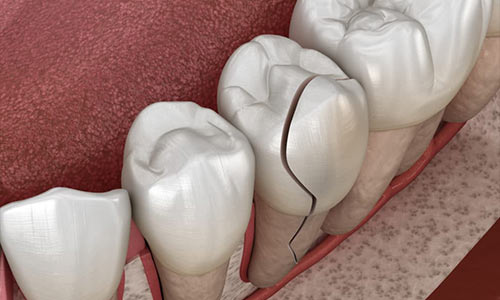
Table of contents

Many of us have experienced this feeling where a tooth begins to ache, sometimes just occasionally, but at other times the ache can be continual and gradually worsens. There are many reasons why a tooth can begin to ache, and the pain created can range significantly but should never be ignored.
Some people experience an only mild toothache that is easy to ignore, but if you choose not to investigate the problem, the pain can increase. A severe toothache can be incredibly painful, so if you have noticed your tooth feel slightly uncomfortable or any changes to your dental health, always take the time to book a dental examination with a good family dentist such as Dr. Shalman.
When you see a dentist sooner rather than later, they can diagnose any issues that much more quickly, getting rid of even mild discomfort. A prompt diagnosis can also save you from greater pain in the future and will almost certainly mean that the treatment required is faster, less invasive, and easier on your wallet.
Conversely, leaving a mild toothache or slight discomfort to progress could result in your needing an emergency dental appointment at an inconvenient time. While an emergency dentist appointment will diagnose the problem, and your dentist will provide treatment to relieve the pain immediately, you will almost certainly need to go back a second time to have the problem corrected properly. You will likely need far more invasive treatment that will be lengthier to complete and, of course, more costly.
The most common causes for tooth pain are:
Cavity. A common cause of tooth pain is an untreated cavity, or if you have a filling that has fallen out or begun to leak or crumble. When you have a cavity in a tooth, it allows harmful bacteria to get inside the tooth where they can infect it, causing more destruction, so the cavity deepens. Eventually, the cavity can reach the central part of the tooth that holds your tooth nerve in a soft tissue called the dental pulp.
Infection. When the tooth nerve becomes infected and inflamed, it is extremely painful, and by this stage, you may need root canal therapy to try to save the tooth. If the infection is especially severe and you have developed a dental abscess, your dentist may be unable to save the tooth and would need to do a tooth extraction to get rid of the infection. Also, don’t forget a dental abscess can become life-threatening in the worst-case because infectious bacteria can travel around your body, including your brain.
Cracked or chipped tooth. Other reasons why your teeth may begin to hurt include having a cracked or chipped tooth and where the effect is the same, as the crack or chip will let in disease-causing bacteria. If you damage a tooth, it’s always important to get it mended quickly.
Exposed tooth roots. Some people suffer from gum recession, exposing the tooth roots. Because your tooth roots aren’t covered with enamel, they are more sensitive to temperature changes and can become decayed more quickly. Often, gum recession will occur because of gum disease. This infectious disease is normally caused by poor oral hygiene that allows bacteria to build up and gradually destroy your gums.
Aging crown or bridge. If you have dental crowns or bridges, these must be checked regularly by your dentist. An aging crown or bridge can begin to leak, and this lets in harmful bacteria that can cause infection and decay underneath the restoration.
Although a good-quality crown or bridge will last for many years, it will eventually need replacing. If you do have older restorations, a new crown or bridge will almost certainly look a lot better because the materials and techniques used to create restorations have improved significantly over the past few years.
Clenching and grinding. Another reason for tooth pain is clenching and grinding your teeth; an issue called bruxism, which is largely nocturnal. Because bruxism occurs during sleep, it can be difficult to recognize that you have this problem. A sleeping partner may comment that you clench or grind your teeth during sleep because the habit can get pretty noisy. Clenching and grinding can wear and chip teeth, causing increased tooth sensitivity and, in the worst case, tooth loss.
Also, bruxism can cause facial pain, including sore jaw joints and facial muscles, and even headaches, so if you recognize the signs, see your dentist soon. When you see a dentist in New York City, Dr. Shalman, he can diagnose if you have bruxism by examining your teeth. He can prescribe suitable treatment, usually by fabricating a custom-made night splint so your teeth can’t touch during the night, and you can no longer clench and grind.
Wisdom teeth. If you have yet to receive your wisdom teeth, these can cause pain when they come through. Unfortunately, wisdom teeth often cannot erupt correctly and become impacted. An impacted wisdom tooth will try to erupt underneath the tooth beside it or could even push sideways through the gums. Sometimes wisdom teeth will erupt partially, so they remain partly covered with gum tissue and are very difficult to keep clean. Consequently, a partially erupted wisdom tooth is more likely to become infected and decayed, and the gum surrounding it can be infected with gum disease.
If you regularly see a dentist, they will be monitoring the position of wisdom teeth in your jawbone using digital dental x-rays. They can detect any potential problems with tooth eruption and, if needed, will recommend your wisdom teeth are removed before they can cause you pain and discomfort and potentially damage the adjacent teeth or your jawbone.
If you have seen a dentist for restorative treatment such as implants, or a full mouth smile makeover, it’s quite common to notice the tooth feels a little more sensitive or is mildly painful. This is because when your tooth is filled, the filling may be quite near to the tooth nerve, and the nerve of your tooth will need time to settle down after treatment.
If you have recently had a filling or a new restoration fitted and it continues to feel painful or uncomfortable, or you notice you cannot bite correctly, contact Dr. Shalman. He can check the restoration and make any necessary adjustments.
Shalman Dentistry
44 W 10th St #1A
New York, NY 10011
(10th St, between 5th & 6th Avenue)
☎ (212) 658-1093
Get Directions (Map)